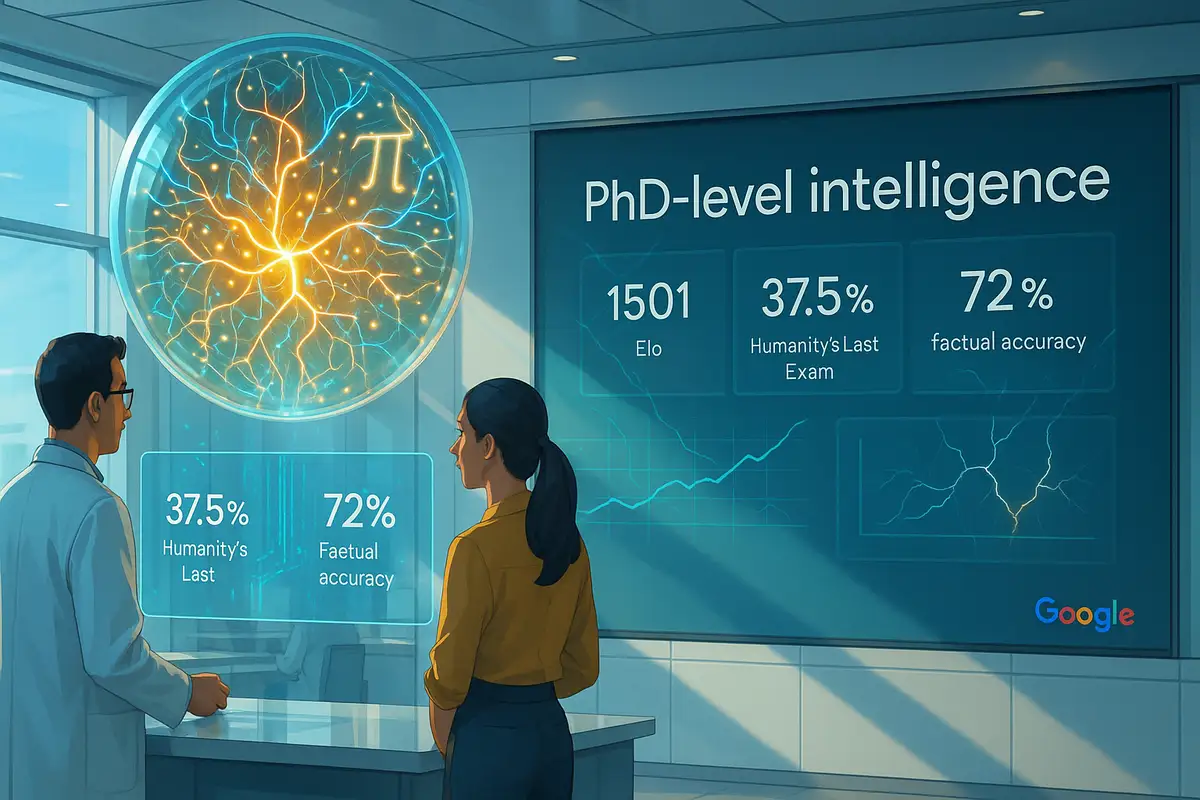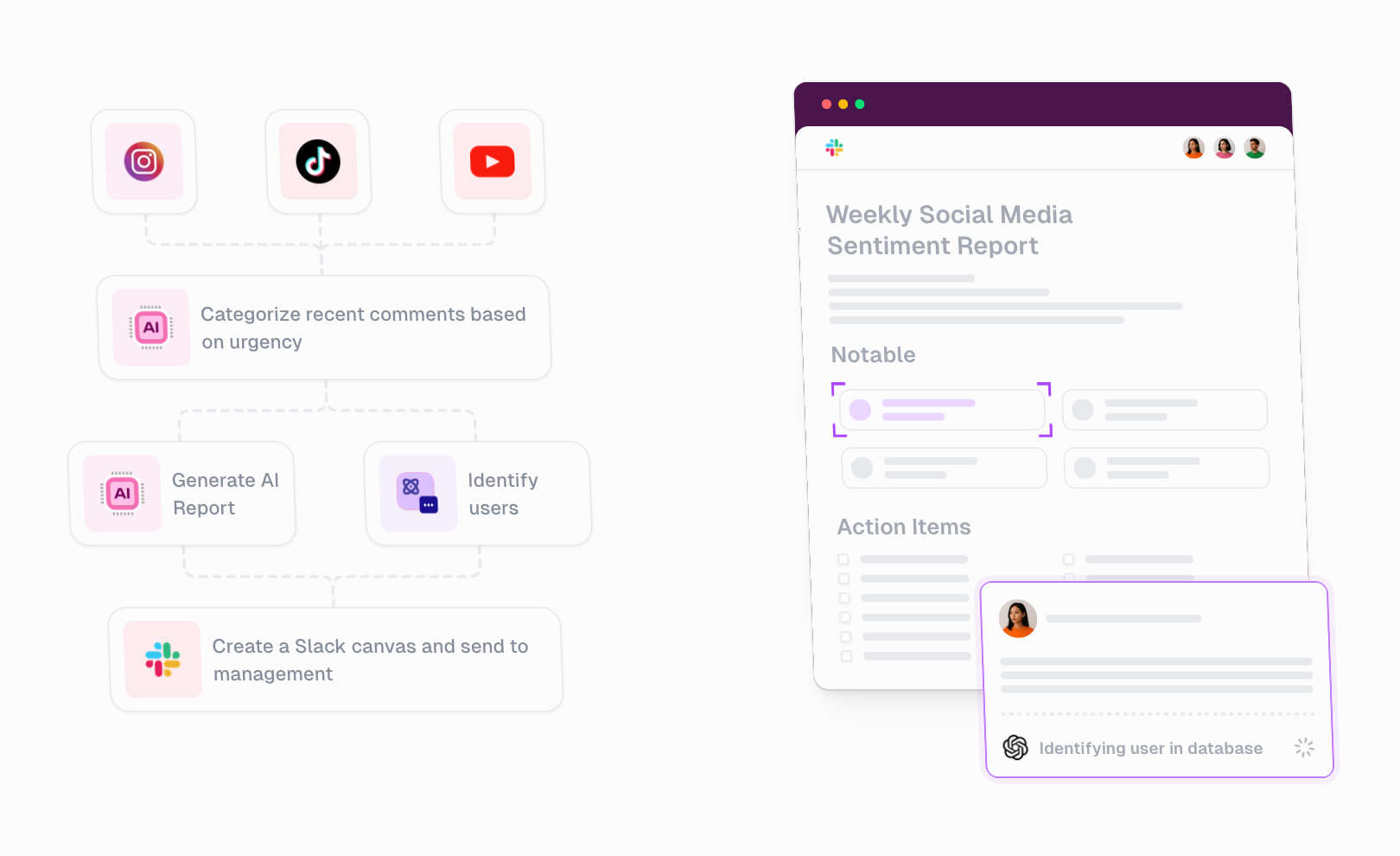Good Morning from San Francisco,
Trump wants Congress to block state AI laws through December's defense bill. The same proposal was rejected 99-1 in the Senate five months ago. Same Republicans still oppose it.
Google launched Gemini 3, claiming PhD-level intelligence. The model gets straightforward questions wrong three times out of ten and takes over a minute to generate results.
Meta won its antitrust case Tuesday. Federal courts declared the company faces fierce competition from TikTok and YouTube. On the same day, PyTorch's creator became the fourth major AI researcher to leave for a startup in recent weeks.
Stay curious,
Marcus Schuler
Trump's Federal AI Preemption Faces Same Republican Opposition That Killed It 99-1

Trump posted on Truth Social Tuesday demanding Congress block state AI regulation through the National Defense Authorization Act, calling state oversight a threat to America's economy.
House Majority Leader Steve Scalise confirmed Republicans are considering adding preemption language to the must-pass defense bill clearing Congress in December.
The problem is this exact proposal died 99-1 in the Senate five months ago. Ted Cruz sponsored the amendment, then voted with 98 other senators to strip it from a July budget bill after bipartisan backlash. The coalition opposing preemption hasn't shifted. Marsha Blackburn and Josh Hawley continue defending state authority to regulate AI systems affecting children, arguing Republican-led states passed laws around deepfakes, biometric data, and automated decision systems that federal preemption would nullify.
Florida Governor Ron DeSantis came out against the renewed effort the same day Trump posted.
Tech companies including OpenAI, Anthropic, and Nvidia support federal frameworks to avoid compliance costs across 50 different state regulations. Trump repackaged the proposal as fighting "Woke AI" and protecting children, but the underlying math hasn't changed. Republican leadership lacks votes to overcome defections from its own caucus.
Why This Matters:
• Second preemption failure in six months would undermine tech industry's China competition arguments across future regulatory debates through 2026
• Republican divide between Cruz-Scalise tech-friendly wing and Blackburn-Hawley state authority faction reshapes coalitional dynamics beyond AI policy

AI Image of the Day

Prompt:
childlike crayon doodle of Rudolph the Red Nosed in a Car, a yellow car,with the text "Hah, hah, hah." in black crayon handwriting ,messy scribbles, uneven coloring, naive drawing style, clean white background
Google's "PhD-Level AI" Admits the Quiet Parts Out Loud

Google launched Gemini 3 with benchmark dominance—1501 Elo on LMArena, 37.5% on Humanity's Last Exam—three months after OpenAI's GPT-5 collapsed under user revolt so fierce that 4,600 Reddit upvotes declared it "horrible" within 24 hours.
Sam Altman had to restore the deprecated GPT-4o model and double usage limits after a broken auto-router made GPT-5 seem, in his words, "way dumber."
Google timed its launch to capture that opening. But the company's own research paper admits generative UI features "can sometimes take a minute or more to generate results," and factual accuracy hits 72.1% on SimpleQA Verified—meaning wrong three times out of ten on straightforward questions.
Wharton professor Ethan Mollick tested Gemini 3 with real research data and got competent PhD-level work with graduate-student problems: some methods needed refinement, conclusions occasionally outran evidence, approaches weren't always optimal. "Human-like errors" replaced hallucinations.
The industry projects $7 trillion in infrastructure spending by 2030 for capabilities that currently deliver supervised assistants, not autonomous agents. Gemini 3's benchmark wins matter less than whether minute-plus generation times and 72% accuracy justify costs OpenAI's stumble couldn't.
Why This Matters:
• Google's timing advantage lasts only until OpenAI fixes its execution or Anthropic releases Claude 4 within six months
• Enterprise AI budgets depend on reliability over benchmarks—72% accuracy forces verification systems that increase deployment costs significantly

Meta Won Its Legal Case While Losing the Competition That Matters

Federal courts declared Meta faces fierce competition on Tuesday, ruling the company no longer holds monopoly power in social networking. Judge James Boasberg dismissed the FTC's five-year antitrust case, citing TikTok and YouTube as legitimate competitors that prevent Meta from dominating measured by user time spent.
The same day, Soumith Chintala, PyTorch's creator, announced he'd joined Mira Murati's Thinking Machines Lab, marking the fourth major AI departure in recent weeks alongside Chief Revenue Officer John Hegeman, Business AI head Clara Shih, and reportedly chief AI scientist Yann LeCun.
Boasberg's framework measures competition through consumer behavior, where users spend time, which platforms they substitute. That lens concludes Meta operates in fierce competition. But talent flow reveals different competitive dynamics entirely.
Thinking Machines raised $2 billion at a $10 billion valuation in February, now seeking $50 billion before shipping any product, offering $450,000 to $500,000 technical salaries according to H-1B filings.
Meta's stock has fallen 20 percent since October despite revenue beating expectations, investors questioning whether $600 billion in AI spending through 2028 generates returns when researchers keep leaving for startups.
Meta cut 600 AI roles in November for agility while top talent exits voluntarily.
Why This Matters:
- Meta investors face accelerating talent retention risk that $600 billion capital commitments cannot solve if researchers choose startup equity over incumbent salaries.
- Antitrust frameworks miss AI's primary competition happening in talent markets, where no company can prevent departures regardless of consumer market share.

🧰 AI Toolbox
How to Automate Workflows Without Coding

Gumloop is a no-code AI automation platform that lets you build powerful workflows using a simple drag and drop interface. Connect over 100 apps like Gmail, Slack, Salesforce, and Google Sheets to automate repetitive tasks, process documents, scrape web data, and streamline business operations. No programming skills required.
Tutorial:
- Go to the Gumloop website and create a free account
- Choose from pre-built workflow templates or start with a blank flow
- Drag and drop nodes to build your automation sequence
- Connect your apps and integrate AI models for smart decision making
- Set up triggers to run workflows automatically or on demand
- Test your flow and watch it process data in real time
- Deploy reliable automations that save hours on repetitive tasks
URL: https://www.gumloop.com
Better prompting...
Today: Generating and prioritizing ideas
Generate [N] distinct ideas for [topic] that meet these criteria: [constraint]. For each idea, provide: (1) a clear one-sentence description, (2) the core insight or angle that makes it distinctive, (3) the primary value it delivers.
Then analyze each idea against [evaluation axis 1] and [evaluation axis 2], rating each on a 1-5 scale. Finally, rank the top 5 ideas and explain your reasoning for the ranking.
Example in use: "Generate 10 distinct ideas for analytical deep-dive articles about AI policy that meet these criteria: must reveal non-obvious implications that major publications are missing. For each idea, provide: (1) a clear one-sentence description, (2) the core insight or angle that makes it distinctive, (3) the primary value it delivers to sophisticated readers.
Then analyze each idea against impact potential (how much it matters) and execution feasibility (resources required), rating each on a 1-5 scale. Finally, rank the top 5 ideas and explain your reasoning for the ranking.
AI & Tech News
Larry Summers Resigns from OpenAI Board Amid Epstein Email Release
Former Treasury Secretary and Harvard President Larry Summers has resigned from OpenAI's board of directors following the release of his email correspondence with Jeffrey Epstein by a U.S. House Committee. Both Summers and OpenAI confirmed his departure from the artificial intelligence company's board in separate statements issued Wednesday.
Adobe to Acquire SEO Software Provider Semrush for $1.9 Billion
Adobe has announced plans to acquire NYSE-listed Semrush, a search engine optimization and marketing software provider, for $1.9 billion in an all-cash transaction valued at $12 per share. The acquisition comes as artificial intelligence increasingly transforms digital marketing, with Semrush serving major clients including Amazon and TikTok by helping businesses optimize their search engine performance and marketing strategies.
Chinese AI Researchers Remain Concentrated in US Despite Tensions
A new study by the Carnegie Endowment for International Peace reveals that 87 of the top 100 Chinese AI researchers working in the United States in 2019 continue their research at American universities or companies as of 2025. The findings highlight the ongoing role of Chinese talent in U.S. artificial intelligence development, even as some Silicon Valley executives characterize China as a competitive threat.
EU Proposes GDPR Updates and AI Act Changes Under Tech Industry Pressure
The European Union has announced proposed updates to its General Data Protection Regulation (GDPR) that would simplify cookie permission pop-ups and outlined plans to weaken the AI Act following pressure from US officials and major technology companies. These regulatory changes mark a significant shift for the EU, which has previously maintained strict digital privacy and AI governance standards despite opposition from global tech giants.
Amazon Loses EU Court Challenge Over Digital Services Act Classification
The EU's General Court has rejected Amazon's legal challenge to remove its classification as a Very Large Online Platform (VLOP) under the Digital Services Act, which applies to platforms with over 45 million users. The court ruled that large online marketplaces like Amazon can pose systemic risks, upholding the EU's authority to subject such platforms to stricter regulatory oversight and content moderation requirements.
Meta Faces Challenges With Australia's Youth Social Media Ban
Meta Platforms Inc. has warned of significant difficulties in identifying and removing underage users as it prepares to comply with Australia's upcoming under-16 social media ban, which takes effect on December 10. The company's concerns highlight the technical and practical challenges social media platforms face in implementing age verification systems to enforce the new regulatory requirements.
Ubisoft to Release Delayed Earnings Report This Friday
Ubisoft Entertainment has announced it will release its fiscal first-half results before trading opens on November 21, following an unexpected postponement of the publication last week. The French gaming company's delayed earnings report has prompted investor attention as markets await the financial performance update from the maker of popular franchises like Assassin's Creed and Far Cry.
NetEase's Martial Arts Game Draws 2 Million Players on Global Launch Day
Chinese gaming giant NetEase reported that over 2 million people played its martial arts-themed game "Where the Winds Meet" within 24 hours of its global release. The strong debut reflects the growing international reach of Chinese companies' cultural influence, particularly through gaming and entertainment exports, as part of a broader trend of Chinese cultural products gaining global traction this year.
Epic Games and Unity Forge Partnership for Fortnite Integration
Epic Games has announced a strategic partnership with Unity Technologies to integrate games built with Unity Engine directly into the Fortnite platform, with the rollout scheduled for 2026. This collaboration represents a significant step in Epic's broader strategy to transform Fortnite from a standalone battle royale game into a comprehensive open metaverse platform where multiple gaming experiences can coexist.
Kuaishou Q3 Earnings Beat Expectations on AI Technology Boost
Chinese short-video platform Kuaishou reported third-quarter net profit of approximately $632 million, surpassing analyst estimates of $588 million with a 37% year-over-year increase. The Beijing-based company's revenue grew 14% to around $5 billion, driven by strong advertising growth and contributions from its Kling AI video generator technology.
South Korean Regulators Inspect Arm Holdings' Seoul Office Over Licensing Practices
South Korean antitrust officials conducted an inspection of Arm Holdings' Seoul offices this week as part of an ongoing investigation into the British chip designer's licensing practices. The regulatory scrutiny follows a complaint filed by Qualcomm, suggesting potential concerns about Arm's business conduct in the semiconductor licensing market.
Lloyds Banking Group Acquires Fintech Startup Curve in £120M Digital Expansion Deal
Lloyds Banking Group has agreed to acquire British fintech startup Curve, which specializes in digital wallet services, for a reported £120 million in a deal expected to close during the first half of 2026. The acquisition represents Lloyds' strategic push to expand its digital offerings and compete more effectively with challenger banks like Revolut in the rapidly evolving financial technology sector.
🚀 AI Profiles: The Companies Defining Tomorrow

Inception Point AI
Inception Point AI runs a content factory disguised as a podcast network. The Venice-based startup cranks out 3,000 AI-generated episodes per week across 5,000+ shows, treating audio like search results you can listen to.
• The Founders
Jeanine Wright (CEO) launched the company in 2023 after stints at Wondery, Amazon, and SiriusXM. Her co-founders include CTO William Corbin, Chief Content Officer Katie Brown, Chief Production Officer Josh Taylor, and Chief Creative Officer John Peed. Seven employees. Venice, California. Wright's pitch? Synthetic hosts never sleep, never negotiate contracts, and cost a dollar per episode.
• The Product
The Quiet Please Podcast Network operates like an audio search engine. 184 AI agents generate everything from weather updates to celebrity biographies in under an hour. Core strength: ruthless speed and volume. The system names shows "Whales" and "Quantum Computing 101" to capture search traffic. Episodes break even after 20 listens thanks to programmatic ads and affiliate links. Total output: 175,000+ episodes and counting.
• The Competition
Wondercraft and Podcastle sell AI podcast tools to creators. Google and Spotify experiment with auto-generated audio inside their apps. Traditional networks watch nervously. Inception Point stands apart by owning the whole stack, synthetic personalities included. Critics call it "AI slop." Wright calls it the future.
• Financing
Zero disclosed VC funding. Revenue hit $770K by late 2025. One M&A offer arrived in April 2025. The company appears bootstrapped, betting that cheap production plus massive scale equals profit without investor capital.
• The Future ⭐⭐⭐
Wright believes AI will soon dominate content creation. If platforms tolerate synthetic feeds and advertisers don't care about robot hosts, the unit economics work beautifully. But if directories start delisting AI podcasts or listeners revolt, the moat evaporates fast. For now, Inception Point is the test case for industrialized audio. 🎙️











